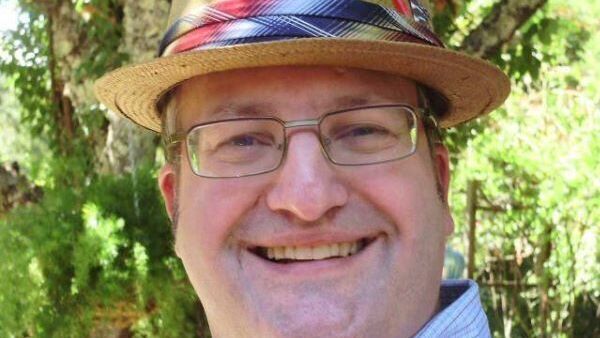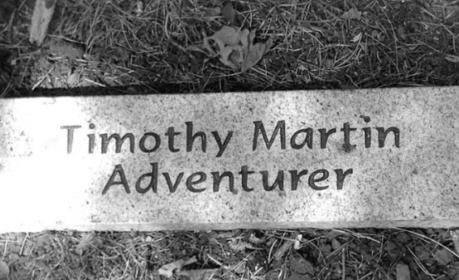The strange, life-affirming nature of loss

This is an article written after my best friend Tim ended his life. It was published in national newspapers around the English-speaking world.
When David Hurst’s soulmate took his own life, his emotions ranged from disbelief to anger, to a numbing sorrow. In a celebratory book, the writer now seeks to honour Tim Martin’s memory.
EVERY morning after waking, I feel the weight of the same questions: “Why?”, “How could he?” and “Could I have done more?”
Bewilderment. Anger. Guilt. A toxic combination, united by overwhelming sadness.
Sometimes my wife, Debs, will detect my discomfort and ask: “Are you thinking about Tim?”
The truth is I’m always thinking about my best friend of 21 years. Or more specifically why he — such a witty, popular person — committed suicide in February last year.
I was a 24-year-old Fleet Street journalist when I met Tim Martin, then 27, on travels in the Caribbean in Dec 1990.
I was sitting with my then girlfriend on a deserted beach when he strolled over.
“Pleasant day,” he said.
“Seen worse,’’ I smiled.
Tim was a “business guy” and artist on holiday from Chicago. With his infectious enthusiasm, he told us about Chicago’s art and architecture, its blues bars, the politics, the parks.
‘Stay with me any time,’’ he said.
I ended my trip with a detour to Tim’s home. I’d split with my girlfriend.
It was an outlandish decision, but one that cemented one of the most extraordinary friendships. Tim was the best host, taking me around the city pointing out all the grand buildings. We had the same humour and chatted for hours. Soon he slipped into an older brother role.
We spoke lots about travelling. Tim and just about everyone in Chicago I met told me about the St Patrick’s Day celebrations and how they dyed the Chicago River in the city bright green. No wonder, as Irish is the top ancestry in Chicago. I told Tim a trip to Ireland was high on my list of countries to see. He said he’d come with me, that we should stay there a while and write a book together.
I left Chicago after a week; it was to be my only trip to his home. But I did make it to Ireland a couple of years later and a few times after that, spending time in Dublin and Kerry. I told Tim about Ireland’s beauty and how inspiring it was, and about the fun we could have in Dublin.
When a few months after my Chicago stay, Tim visited me in London, we vowed that Ireland would be a country we’d definitely visit one day. From then on, he’d fly out to see me at least once a year. In between we wrote long letters to each other and spent hours on the phone. These were replaced by emails, Facebook and Skype. Ever spontaneous, Tim would say: “I’ve found some cheap flights… see you tomorrow!” I’d meet him at the same coffee shop in Heathrow and away we’d go.
As is often the way with close friends, our lives began to mirror each other, even though Tim was a self-assured gay American; and I was a quietly spoken straight Englishman.
He adopted a son, Andrew, who was then 10. I’ll never forget his ebullience on the phone that day: “I have a son!’’
A couple of years later, Tim settled with a boyfriend, and in 2005, I married Debs. Both of us moved to the countryside. Then came our two beautiful sons, Daniel, now 4, and Darley, 2.
Tim last visited in Dec 2006, just before we left London. We saw in the New Year with typical energy. If I’d known our parting hug would be the last, I’d never have let Tim go.
I felt aghast when, after his death, I worked out we hadn’t seen each other for six years. I’d thought it was only a couple.
Thankfully, the thing about a soulmate is that friendship isn’t diminished by absence. We were in weekly, often daily, contact. He was planning to visit us just before depression took hold.
There had never been any hint of it before, although friends commented that, in his startling wit and incisiveness, Tim was an American version of Stephen Fry, who spoke of his own desire to take his life earlier this year.
It was 10 days before Christmas 2011 when he sent me a chilling line: “I might just kill myself.”
I replied: “Don’t. Want to chat?”
That’s how we conversed, downplaying drama.
His partner had left him for someone else, his son had flown the nest to start adult life, his business wasn’t going well and he had diabetes. At 48, I think he felt washed up.
For two months we emailed and skyped. One minute he was telling me he didn’t “want to live anymore”; next, he was planning to visit.
Whenever I discussed it with Debs, we agreed he’d never take his life. This was Tim: unassailable and worldly-wise.
I sent him photos to remind him of the good old days, messages from my two boys, whom he was yet to meet. I said I loved him many times.
A week before he died, Tim wrote: “Remember I had a very full life with lots of amazing places, events and people. Of all of them you’re the highlight.”
How I wish I’d told him he was one of my highlights too. Instead I thanked him, and promised to Skype soon.
Our last messages were on Feb 23, 2012. I was asking to Skype and he replied: “I need to sleep.” I replied: “Have sweet dreams”, an eerily pertinent response.
Four days later, I was browsing Facebook when I saw Tim’s page. “Oh my God, he’s done it,’’ I said.
It felt as if my blood had drained away. Debs took hold of me and we just stared at the screen. His son and his ex had posted messages that they’d always miss him. I contacted Tim’s nephew. He confirmed my fears — Tim had hanged himself in the early hours of the morning.
I just felt numbness.
Darker emotions were to follow. The anger at what many people said was a ‘selfish act’’ (I’ve since accepted that while the act might be selfish, Tim was not), the agonising guilt. I should have got on a plane to see him.
Naturally there were tears. I wrote a letter to Tim, an outpouring of these complex emotions. I walked up the lane by our house to the sublime moorland views.
There, I read the letter aloud, my voice shaking, my heart thudding. When I finished, I set it alight and watched as fire took hold, eating the feelings in those words.
Last June, I found myself starting to write about our friendship. It, too, was cathartic. Then I realised it could help others in a similar predicament as well as remind people of the brilliance of friendship. I called it Relentlessly Me, which is something Tim tweeted about always being and that summed up perfectly how he lived.
Our two boys are too young to understand, but the other day Daniel saw me looking at Tim’s photo and asked: “Who’s that?” It triggered our first chat about life and death. His brow crinkled as I told him Tim was “asleep in the clouds”.
Then there’s the strange life-affirming nature of loss. It goes something like this: I’m so lucky to be alive, to delight in these amazing views, all the wonderful people… If only Tim were here to share it. This will definitely hit me hard when I return to Ireland some time in the near future, and the best I can do is have a drink in Tim’s memory.
And then there’s the fact you hug your family and friends that much tighter.
Tim was full of life and he’d hate for me to suggest otherwise, or to be otherwise.
It’s about celebrating things we shared. I have such wonderful memories: how I wish with all my heart we could just make more of them.

– Relentlessly Me by David Hurst is available as an ebook from Amazon.
This original article: https://www.irishexaminer.com/lifestyle/arid-20247406.html
